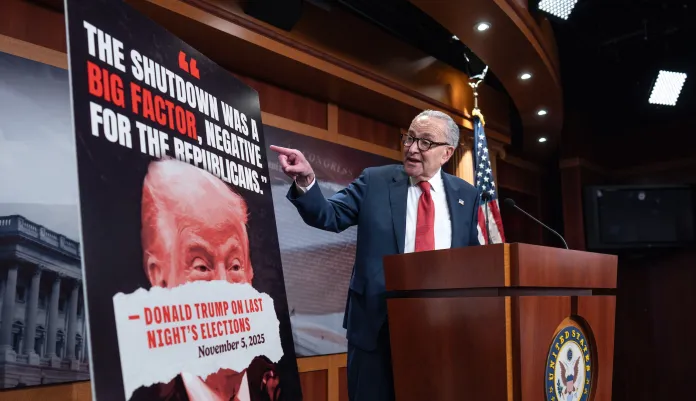Senate Minority Leader Chuck Schumer’s (D-NY) refusal to budge on a monthlong government shutdown paid dividends at the ballot box Tuesday night as Democrats brought purple states, most notably Virginia, more firmly under their grasp.
In a Wednesday press conference, Schumer explicitly credited the shutdown with helping Democrats win the governor’s race in that state, plus elections in New Jersey, Pennsylvania, and beyond.
“The election results were not vague. They were not unclear. They were a lightning bolt: Trump, America doesn’t like what you’re doing. Change course,” Schumer said, standing next to a poster of remarks the president made to Senate Republicans just hours earlier.
Trump and Glenn Youngkin (R-VA), the outgoing Virginia governor, were among the Republicans conceding the issue hobbled their party the following morning.
“I firmly believe that, particularly the government shutdown, was a very big challenge as we ran into this election,” Youngkin said, noting that more than 300,000 federal workers who reside in the state were “hurting” the longer it lasts.

Publicly, Schumer has staked the shutdown fight on expiring Obamacare subsidies, steeling his caucus against a short-term funding bill unless Republicans commit to an extension. Yet the impasse is seen as inextricably tied up in electoral politics, and Republicans have griped that it’s no accident Democrats are more willing to restart bipartisan talks with the races behind them.
Previously, Republicans blamed the length of the shutdown on Democrats not wanting to upset their base, citing the nationwide “No Kings” rallies two weeks ago.
The same argument was made again about Election Day, with Republicans claiming that Democrats did not want to deflate voter enthusiasm in some of the earliest bellwether races of Trump’s second term.
Schumer flatly rejected that notion on Wednesday.
“Give me a break. We’ve been trying to meet with Thune and Johnson since late July,” he told the Washington Examiner, referring to the top two GOP leaders. “We’ve been trying to meet with Trump since September, and they’ve said no.”
He added: “We’re not the ones waiting – they are – but maybe this election is a wake-up call for them.”
Schumer’s mood was nonetheless upbeat in light of the results. He predicted that control of the Senate is “much closer than people and prognosticators realize” and noted again his demand that Trump sit down with him and House Minority Leader Hakeem Jeffries (D-NY) to negotiate the Obamacare subsidies.
The election victories could end up being a consolation prize for Schumer, with Republicans more confident than ever that enough Democrats will soon cave to reopen the government.
The GOP spending bill, which already passed the House, has failed 14 times on the Senate floor, but Schumer’s coalition is beginning to crack six weeks into the shutdown as rank-and-file Democrats get cold feet over the impact to food stamp benefits and delays at the nation’s airports.
That anxiety has breathed momentum into bipartisan spending talks that could leave Democrats empty-handed on their chief demand, an ironclad commitment to extend the subsidies.
But Schumer has long conceded that his secondary goal is to erode popular support for Trump, with the shutdown being one of those inflection points. On Wednesday, he cast the standoff as just one battle in a “war” to lower healthcare costs.
There is blame to be shared by both parties, according to public polling on the shutdown, and Republicans believe the pressure is greater on Democrats, given that they are the ones making policy demands.
In the aftermath of the elections, Republicans also noted that many of Democrats’ victories were in traditionally blue states or in races with weak candidates.
The elections are still grating on Republicans, however — in particular Trump, who wants to cut Democrats out of the equation entirely by ending the Senate filibuster.
Senate Republicans have resisted that move, and did so again after a Wednesday breakfast at the White House, meaning the end of the shutdown will require a bipartisan solution.
DEMOCRATS ROMP IN OFF-YEAR ELECTIONS, EMBOLDENING FIGHT AGAINST TRUMP
But Schumer has not publicly said whether he will bless the bipartisan spending talks or something short of their healthcare demands.
“I’m not going to negotiate in public,” Schumer said at his press conference, “but the bottom line is simple: The election, the American people have spoken. End the shutdown, resolve this health care crisis, sit down and talk with us.”
